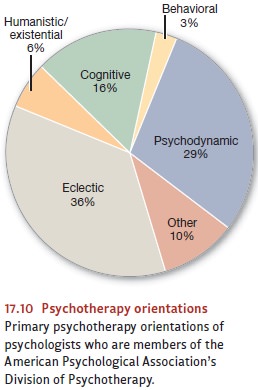Chapter: Psychology: Treatment of Mental Disorders
Psychological Treatments: Integrated Treatments and Eclecticism
Integrated Treatments and Eclecticism
The
marriage of behavioral and cognitive therapies that yields the
cognitive-behavioral approach is not the only blending of therapy types that
has been going on. Indeed, the last few decades have seen a strong trend toward
psychotherapists endorsing what is sometimes called multimodal therapy or eclecticism—a deliberate weaving
together of the various traditions (Beitman, Goldfried, & Norcross, 1989;
Lazarus, 2006; Norcross & Freedheim, 1992). This broad tendency is evident
in the work of many clinicians; in fact, when U.S. psychologists are asked to
describe their work, the thera-peutic approach that most identify with is
eclectic/integrative (Prochaska & Norcross, 2007; see Figure 17.10). As one
example of this tendency, consider Marsha Linehan’s dialectical behavior
therapy (DBT) for borderline personality disorder. DBT grew out of the
cognitive approach, but includes elements from cognitive, behavioral,
humanistic, and psychodynamic therapies to address the profound emotion
dysregulation associ-ated with borderline personality disorder (Linehan, Bohus,
& Lynch, 2007).

This
eclecticism obviously allows the therapist flexibility to tailor his approach
to the specific needs and symptoms of each patient. And over the course of
treatment, it allows the therapist to pursue lines of discussion or specific
interventions that are working and to back off from interventions that are
ineffective. In addition, multimodal therapy makes sense theoretically. We saw
that mental disorders rarely have a single cause; instead, they emerge from a
complex set of factors creating the diathesis as well as factors creating the
more immediate stressors. It seems sensible, therefore, that treatment might
need to work on multiple fronts, which is precisely what multimodal therapy is
designed to do.
Related Topics